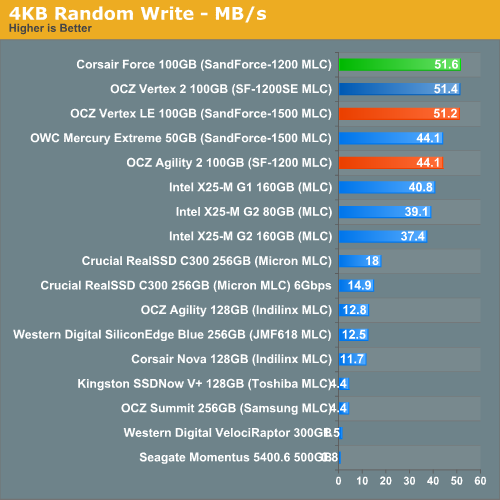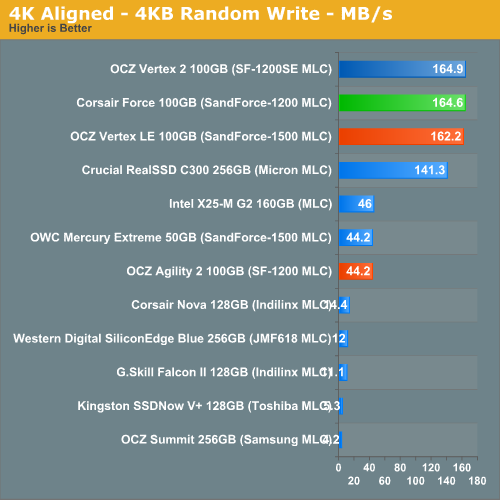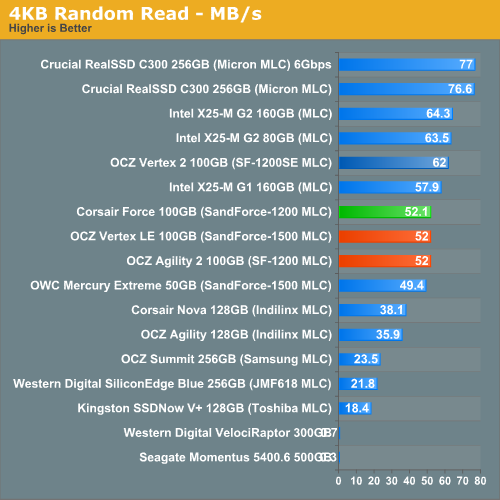OCZ's Vertex 2, Special Sauce SF-1200 Reviewed
by Anand Lal Shimpi on April 28, 2010 3:17 PM ESTRandom Read/Write Speed
This test reads/writes 4KB in a completely random pattern over an 8GB space of the drive to simulate the sort of random access that you'd see on an OS drive (even this is more stressful than a normal desktop user would see). I perform three concurrent IOs and run the test for 3 minutes. The results reported are in average MB/s over the entire time.
I've had to run this test two different ways thanks to the way the newer controllers handle write alignment. Without a manually aligned partition, Windows XP executes writes on sector aligned boundaries while most modern OSes write with 4K alignment. Some controllers take this into account when mapping LBAs to page addresses, which generates additional overhead but makes for relatively similar performance regardless of OS/partition alignment. Other controllers skip the management overhead and just perform worse under Windows XP without partition alignment as file system writes are not automatically aligned with the SSD's internal pages.













44 Comments
View All Comments
carleeto - Thursday, April 29, 2010 - link
I don't think people are going to use an SSD for music and movies any time soon. At least, not until the price per GB falls within 200% of a normal hard drive. Where I could see this kind of thing being used a lot on an SSD is with a Truecrypt partition that is used to store source code, documents, mail etc. That's a lot of small writes and reads and the result, because of the encryption layer is really quite random. So I'd actually disagree with Anand here - it is something that is going to be quite relevant to a security conscious user and that is quite a large market, when you factor in enterprises.NandFlashGuy - Wednesday, April 28, 2010 - link
At my workplace, all PCs have PGP software installed. That should make the data in all writes to disk look like random data, meaning less than optimal performance.Anand, can you measure performance under the normal benchmarks with PGP installed? It's a realistic use case for anyone in the corporate world.
Squuiid - Wednesday, April 28, 2010 - link
Anand, any news on how your replacement Crucial RealSSD C300 is holding up? Did Crucial fix the performance deterioration bug you last talked about?Can you recommend the Crucial over the Vertex 2, or vice versa?
Grit - Wednesday, April 28, 2010 - link
I'd like to second that request. The Crucial drive manages impressive speeds in most benchmarks and does so without the loss in space. I can live with a 256GB SSD, but a 200GB SSD is cutting it a bit too close.DesktopMan - Wednesday, April 28, 2010 - link
Will there be any tests on the AES features? Since this is a feature not present in most SSDs an article on how it works and performs would be very interesting.vol7ron - Wednesday, April 28, 2010 - link
All these comments, so little time :)Looks good.
diamondsw - Wednesday, April 28, 2010 - link
As much ink has been spilled about SandForce, I still haven't seen anything that would indicate it's a better choice than the Crucial RealSSD C300, which has better performance at a (slightly) better price. Am I missing something important?arehaas - Wednesday, April 28, 2010 - link
Crucial C300 have a problem with its firmware that Crucial hasn't solved yet. Performance degrades significantly. Anand found this problem in a "Crucial's RealSSD C300: An Update on My Drive" from March 25. Crucial is currently promising to release the new firmware in mid-May, but they have shifted this deadline already twice. There is no guarantee they will manage to do it in May. Major reviewers do not recommend buying C300 SSD yet.xiphmont - Wednesday, April 28, 2010 - link
I expect Crucial will fix their firmware issue just as it appears that Sandforce has fixed theirs.The Sandforce's redundancy (silent correction and reprovisioning around bit errors and failed flash cells) is what sells me on the Sandforce. If the promises are true, these drives will last longer and throw unrecoverable errors far less often as the NAND ages. Performance is a nice extra.
It terrifies me that the other mass production SSDs appear to offer no redundancy or error detection/correction of stored bits at all.
jimhsu - Thursday, April 29, 2010 - link
Sandforce attempts to scare you with this in their marketing literature. ALL SSDs (even crappy first gen JMicron ones) do a substantial amount of error correction (the raw error rate for flash is something ridiculously bad like 10^-7 to 10^-8). I think even camera flash memory has embedded error correction (don't take my word for it though). Sandforce just does "more" than its competitors.